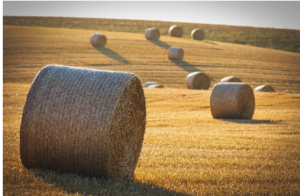Baling twine is made from biodegradable natural fibres that won’t pollute the environment. Plus, its many uses make it perfect for everyday life.
Most made-in-the-USA options feature guaranteed footage per carton, saving time and money when purchasing baling twine.
 Biodegradable
Biodegradable
Baler twine 9000 intended for balers should be durable, with high tensile strength and resistance to knotting, UV protection, and capable of functioning in various environmental conditions. Producers should have peace of mind knowing they won’t need to reload cartons more frequently than needed.
Baling twine is used to secure fibrous materials like straw and hay into an easily stackable form for transport or storage, typically made of synthetic fibres such as polypropylene. Due to its durability and recyclability, polypropylene has long been the go-to material. But more eco-friendly options like corn starch are now becoming viable alternatives that break down easily into the soil while decreasing environmental harm.
Recyclable
Many farmers generate an excess of baling twine waste when feeding their livestock, often ending up in landfills or burned on farms as waste disposal options. By recycling it instead, this material can help decrease environmental pollution while supporting green living practices.
Bailing twine can be turned into numerous useful household items, from recycled baskets and doormats to beautiful crocheted crafts. It can be reused, and bailey twine also makes a thoughtful present for farmers and agricultural workers.
Though baling twine is widely utilised and durable, it can still present physical hazards to humans and animals. If not handled carefully, baling twine can tangle or fray, leading to cuts or abrasions from being caught between fingers; also, it can become indigestible by livestock, which could result in digestive problems and death; therefore, livestock farmers need to consider sustainable alternatives to traditional baling twine as well as adopt sustainable practices; livestock should also be fed accordingly so as not to consume the twine itself.
Durable
Baling twine can be found in most households living near agricultural areas. It efficiently compacts fibrous material like hay or straw into stackable bundles that won’t pollute the environment while being entirely biodegradable.
Opting for the appropriate type of twine can ensure maximum durability and performance, and its colour segment can help match it to your baler, crop, and level of baling conditions – ultimately optimising your baling process and maximising productivity.
Baling twine can serve multiple functions around your barn beyond just tying up hay and straw bales, such as creating horse rope halters or braiding several strands into lead ropes or lunge lines. Furthermore, baling twine is great for emergency use if tailgate cables suddenly stop working – handy in case they go out unexpectedly!
Versatile
Baling twine is an indispensable material in any farm setting, providing many uses beyond simply tying bales together. While commonly employed to secure bales together, this polypropylene or sisal twine can also mend fences and reattach tractor parts.
LSB Power was specifically created to meet the needs of various baler densities. It provides a balanced combination of strength and knot resistance, coming in various colours for easy identification. Plus, its optimal cost per bale delivers real savings.
Manufacturing twine starts with melting the PP sheet that is then rolled using rollers to achieve uniform thickness and consistency before being cooled and stabilised to increase twine elongation, durability and resistance. Once stabled, it is twisted into rope form for further processing before cutting to the desired length for commercialisation.
Affordable
Baling twine is an affordable and straightforward alternative to standard twine. Constructed from natural, biodegradable material, it boasts excellent knotting properties while being durable enough for many different tasks – wrapping hay bales or packaging waste materials are just two uses that you may find beneficial; livestock are safe using this twine too! Plus, it works great on various baler machines!
Baling twine can also be an invaluable resource for fixing fences. From patching holes or keeping broken boards together until repairs can be made to suspending poultry feeders or hay nets to securing equipment tarps over equipment and acting as temporary trellises for climbing plants, baling twine is an invaluable tool that is both versatile and cost-effective.